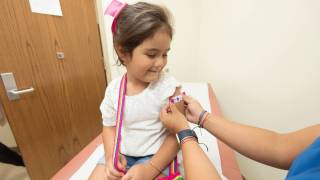31% of Nurses Unsure Flu Vaccines Are Safe

Nurses are usually ranked as the ‘most trusted’ healthcare provider. But, do nurses trust the annual flu shot?
According to a new survey, a majority of home health nurses trust the influenza vaccine’s efficacy.
This new study found only 68.5 percent of home health nurses in the sample agreed that the influenza vaccine is safe.
This is unfortunate news since a recent study reported most people are influenced by what their healthcare provider says about vaccines.
These results suggest that home healthcare agencies may benefit from ‘better-educating’ nurses on the influenza vaccine’s benefits.
"Nurses play a critical role in infection control in home healthcare settings," said the study's lead author, David Russell, Ph.D., Center for Home Care Policy & Research, Visiting Nurse Service.
"Moving beyond a singular focus of knowledge by sharing messages that challenge perceptions of the influenza vaccine may go a long way toward enhancing compliance with effective infection control strategies," said Dr. Russell.
This study reported a high level of infection control compliance (89%), correct knowledge (85%), and favorable attitudes (81%).
And, older nurses generally reported higher compliance with infection control practices than younger nurses.
Additionally, this survey reported 100 percent nurse compliance with wearing gloves when anticipating contact with body fluids or blood products.
But, when delivering vaccines, wearing gloves is not required for healthcare workers and pharmacists when administering vaccinations, says the Centers for Disease Control and Prevention Best Practices Guidance and the Occupational Safety and Health Administration.
"This study demonstrates the importance of understanding and addressing home healthcare nurses' misperceptions about infection control measures," said 2018 APIC President Janet Haas, Ph.D., RN, CIC, FSHEA, FAPIC.
"Efforts to improve compliance need to update knowledge and target common misperceptions in order to reinforce proven methods of infection prevention and control," said Dr. Hass.
This means, people often benefit from receiving the right information, at the right time even healthcare providers.
These trusted health care providers realize there is more than one way to understand parents' views about immunization, reports the American Academy of Pediatrics.
Some parents have virtually no vaccination information.
But when they are offered data about vaccine harms and benefits, parents usually give permission for their child to be immunized.
Other parents may have inaccurate information which can easily be corrected by offering the latest research.
“Providers can positively impact immunization rates by listening to the concerns of parents, combatting any misinformation with strong evidence-based research, and allowing the parents to make informed decisions”, said Chris Felton, PharmD, Clinical Pharmacist at Brookshire Grocery Company.
“It is incumbent upon us to know all of the information that our patients are hearing…good and bad so that we can engage with them in a constructive conversation, “ added Felton.
Our Trust Standards: Medical Advisory Committee
- The home healthcare frontier: new study explores nurses' knowledge attitudes toward infection control
- Factors for compliance with infection control practices in home healthcare: findings from a survey of nurses' knowledge
- Childhood Immunization: When Physicians and Parents Disagree
- Trust Flu Information Delivered By Health Professionals
- Addressing Parental Vaccine Concerns

























